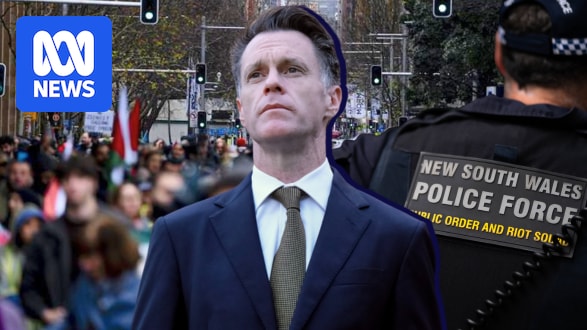
When 60 neo-Nazis lined the front gates of New South Wales (NSW) parliament last week, the response from Premier Chris Minns was swift and familiar. As public outrage mounted over how the rally proceeded under police watch, Minns used his first press conference to hint at introducing more stringent protest laws.
“It’s likely the case that we need to give the police more legislated powers to stop this kind of naked hatred and racism on Sydney’s streets,” Minns told reporters. In the days that followed, he confirmed plans to reintroduce amended controversial police powers that were struck down by the NSW Supreme Court last month. This marks the latest chapter in a long-running pattern of successive NSW governments steadily tightening the state’s protest laws in response to flashpoint events.
Legal academics and civil libertarians are raising alarms, fearing that the cumulative effect is eroding one of democracy’s core freedoms in the state — the right to dissent.
Warnings Ignored
ASIO director-general Mike Burgess had earlier warned about the neo-Nazi group behind the rally, citing their “hateful, divisive rhetoric and increasingly violent propaganda.” Despite these warnings, the rally went ahead, authorized by police. Both Minns and NSW Police Commissioner Mal Lanyon claimed they were unaware of the rally beforehand, attributing it to a communication breakdown.
Deliberately inciting racial hatred was made a criminal offense in August after the government expanded section 93ZA in the Crimes Act. The legislation was rushed through parliament following the Dural caravan hoax in January and has since been subject to a parliamentary inquiry. Police later revealed the caravan full of explosives was not a terrorist plot but a “con job” fabricated by organized criminals.
The new hate speech laws were not applied during the neo-Nazi rally, and police are reviewing whether any offenses occurred. Legal advice suggested that blocking the rally was unlikely to succeed in court, which NSW Council of Civil Liberties president Timothy Roberts criticized. “They completely waved it through, so not only do I believe that they could have challenged it, they were aware of the illegality of the protest,” Roberts said.
The ‘Erosion’ of Protest Rights in NSW
According to the Human Rights Law Centre’s senior lawyer David Mejia-Canales, NSW has some of the “most restrictive anti-protest laws” in the country. Over the past decade, successive governments have expanded police powers and criminal penalties. In 2016, the Baird government introduced move-on powers near mining sites after coal seam gas protests. In 2022, the Perrottet government made it an offense to block major roads and entry to important facilities after blockades at Port Botany.
This year, the Minns government created move-on powers for protests near places of worship — powers that the Supreme Court later ruled unconstitutional. Timothy Roberts argued that the intention to reintroduce the amended bill would again overstep legal boundaries. “Minns is proposing not only overly zealous laws that are eroding our civil liberties but ones that have already been proven to be constitutionally invalid,” he said.
NSW Attorney-General Michael Daley told parliament the government was acting quickly and makes “no apology for reintroducing strong laws to protect the community.” He emphasized that the amendments balance community protections with the freedom of political expression. Meanwhile, the premier stated that the government is exploring including Nazi behavior and speech alongside Nazi symbols in hate speech laws “to ensure that there’s no ambiguity” about this behavior in NSW.
Debate Lingers Around Laws
The NSW Shadow Attorney-General Alister Henskens argued that the Minns government was not going far enough in its protest laws. Henskens suggested that while the authorization process for protests focused on public safety, more guidance was needed for what considerations the courts or police commissioner should examine beforehand. “We think that our law enforcement and court process should be given some more tools to promote social harmony rather than just allowing hatred to be flourishing in our streets in the guise of exercising freedom of speech,” he said.
Luke McNamara from the Faculty of Law and Justice at UNSW commented on the broad discretion granted by move-on powers with little oversight. “There’s a long history of move-on powers being used against young people, against Aboriginal people in ways that are problematic, and some research has shown that that is uneven in its impacts,” McNamara said.
Professor McNamara noted that the current Form 1 system — also known as Part 4 of the Summary Offences Act — was originally designed in 1979 to facilitate and embrace the right to protest, not restrict it. He criticized successive governments for making incremental changes “in haste,” ultimately undermining its intent. “They’ve been made under pressure cooker environment circumstances. They are not good conditions for making criminal laws or police powers laws,” he said.
Timothy Roberts added that the system is becoming increasingly unfit for purpose and needs a redesign. “[The Minns government is] inflaming an atmosphere of contempt for protest, for disregarding what is such an important part of our democratic society,” he said.
The Impact on Protesters
Former Greens candidate Hannah Thomas described herself as a “walking example of the dangers of anti-protest laws and rhetoric” in NSW. In June, Thomas was participating in a pro-Palestinian protest when she was allegedly punched by an officer, causing damage to her eye. Police charged the officer with recklessly causing grievous bodily harm, while the Director of Public Prosecutions dropped all charges against Thomas.
Prior to this, police announced they would drop a charge which relied on a rarely used emergency power introduced after the 2005 Cronulla riots. “I would say they didn’t know what powers they were relying on,” Thomas said. “I think they were generally indifferent to the limitations of their powers.”
The ongoing debate over protest laws in NSW highlights the delicate balance between maintaining public order and preserving civil liberties. As the government continues to navigate this complex terrain, the implications for democracy and freedom of expression remain a critical concern for many.







